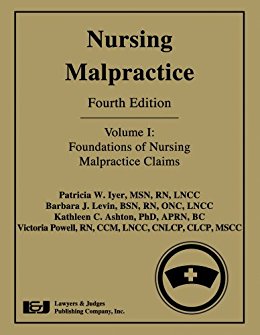
What are common sources of malpractice complaints against nurses? The most common event is medication error. Most people worry about common errors like wrong dose, wrong drug, and wrong route of administration. But one less commonly considered drug-related responsibility is assessment for side effects and toxicity of medications administered.
Other common reasons include failure to adequately monitor and assess the patient, and failure to supervise a patient that results in harm. Significant changes in patient condition must be reported to the responsible physician. However, doing so does not necessarily get the nurse off the hook. If the physician’s response leads the nurse to believe that they have misdiagnosed the problem or are prescribing an incorrect drug or course of action, the nurse is obligated to follow the chain of command to notify a nursing supervisor or other physician of the event.
And finally, one of the most common issues complicating malpractice cases of any kind is documentation. Lawsuits must typically be filed within two years of the event that caused harm. Once that occurs though, several more years may pass before significant action occurs. Collection and review of documentation, identification of experts, and collection of depositions takes time. And unfortunately, our memories are imperfect after many years go by. Good documentation is paramount! “Work not documented is work not done,” I always say. And poor documentation allows attorneys to make your good work look as bad as they want and need it to.
Reference: Examining Nursing Malpractice: A Defense Attorney’s Perspective. Critical Care Nursing 23(2):104-107, 2003.

